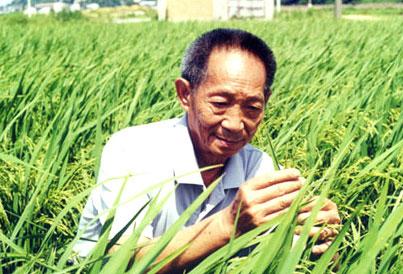It could take some time for China's new breed of super rice to be cultivated on a large scale, said Liu Shi, chief executive officer of Yuan Longping High-Tech Agriculture Co Ltd (Long Ping High-Tech).

Yuan Longping, expert in hybrid rice.
"The super rice requires a certain planting environment, and we are now targeting 2 million to 2.5 million hectares of high-yield fields in China," Liu said in an exclusive interview with China Daily.
Liu said the company was not considering exporting seeds of the new variety for the time being.
Agricultural experts estimated that it could take three to five years for the company to realize widespread planting of the variety.
But once that goal is realized, the increase in production will help the country maintain its food security and grain self-sufficiency, they said.
China's new breed of hybrid rice, cultivated by prominent scientist Yuan Longping, set a world output record of 13.9 tons a hectare in a trial on Sept 19.
According to the National Bureau of Statistics, the country's rice yield stands at 6.3 tons a hectare on average, about half of the new breed.
The benchmark for China's rice output has been pushed up by the trial, but in reality, things might not be as easy, Jing Fei, a seed expert at Bohai University in northeastern China's Liaoning province, said.
Jing warned that more trials are needed to establish the actual output of the new rice.
"The new breed gave a full display of the potential output of super rice. But in large-scale planting, factors such as nutrients and climate are at play.
The new variety's adaptability needs further tests," Jing said.
Liu, the company's CEO, agreed. "We have a good seed variety, but it cannot be planted everywhere in China."
"We should also have a clear market position for the new variety," he added.
Liu said the company will focus on providing service and technical support to farmers in promoting the super rice.
"We need to create value for the farmers first," Liu said.
Ma Wenfeng, a senior analyst at Beijing Orient Agribusiness Consultant Ltd, praised the company's business model.
First step
"Long Ping High-Tech's business is strengthened by its research and development capability," Ma said.
"For large-scale planting, the record-breaking trial is the first step in a long march," he added.
Nevertheless, the new rice breed offers bright prospects for the country's rice supply. China has long stressed the significance of grain self-sufficiency, particularly for rice, the country's staple food.
"Unlike soybeans and corn, rice is not so widely planted in other countries. China's rice demand is too huge to depend on imports from the international market," Ma explained.
"The new super rice helps alleviate pressure from the surging demand, which has been driven up by China's growing population and the process of urbanization," he added.
On Sept. 20, the Ministry of Agriculture released its five-year plan for grain production.
Under the plan, China will strive to achieve 100 percent self-sufficiency for rice, wheat and corn between 2011 and 2015, compared with 95 percent self-sufficiency in the 2006-2010 period.





